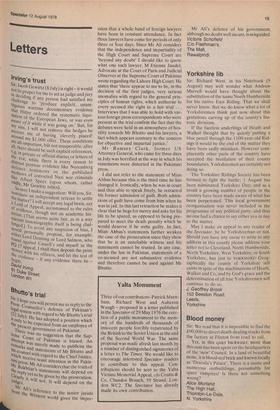h utto's trial „ s sir: I hope you will permit me to
reply to the irress Counsellor's defence of Pakistan's 'egal system with regard to Mr Bhutto's trial (22 July), He has adopted a position which is only to be expected from an employee of the Present government of Pakistan. There was no suggestion that the Supreme Court of Pakistan is biased. An attempt was merely made to publicise the r•entarks and statements of Mr Bhutto and his counsel with regard to the Chief Justice, Which receive scant attention in the Pakistani press. Mr Ali considers that the truth of Mr Bakhtiar's statements will depend on the reply Yet to be given by the prosecution. Clearly early it will not. It will depend on the Judges. Mr Ali's reference to the senior jurists from the Western world gives the impre
ssion that a whole band of foreign lawyers have been in constant attendance. In fact three lawyers have come for periods of only three or four days. Since Mr Ali considers that the independence and impartiality of the High Court and Supreme Court are 'beyond any doubt' I should like to quote what one such lawyer, M Etienne Jaudel, Advocate at the Court of Paris and Judicial Observer at the Supreme Court of Pakistan wrote regarding the Lahore High Court. He states that 'there appear to me to be, in the decision of the first judges, very serious anomalies with regard to the general principles of human rights, which authorise to every accused the right to a fair trial . . . Interviews that I was able to hold with various foreign press correspondents who were present at the trial confirm the fact that the debates were held in an atmosphere of hostility towards Mr Bhutto and his lawyers, a fact which appears contrary to the concern for objective and impartial justice.'
Mr Ramsey Clark, former US Attorney General, who came for three days in July was horrified at the way in which his statements were distorted in the Pakistani press.
I did not refer to the statement of Mian Abbas because this is the third time he has changed it. Ironically, when he was in court and thus able to speak freely, he retracted his former admission of guilt. Both admissions of guilt have come from him when he was in jail. In this last retraction he makes it clear that he begs for mercy and asks for his life to be spared, as opposed to being prepared to meet the death penalty which he would deserve if he were guilty. In fact, Mian Abbas's statements further weaken the case of the prosecution since they show that he is an unreliable witness and his statements cannot be trusted. In any case, under the law in Pakistan, statements of a co-accused are not substantive evidence and therefore cannot be used against Mr Bhutto. Mr Ali's defence of his government, although no doubt well meant, is misguided. Victoria Schofield C/o Flashman's, The Mall, Rawalpindi.






























 Previous page
Previous page